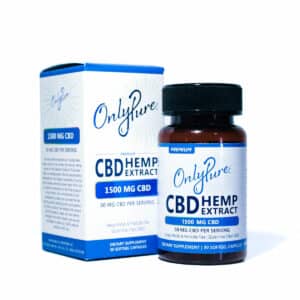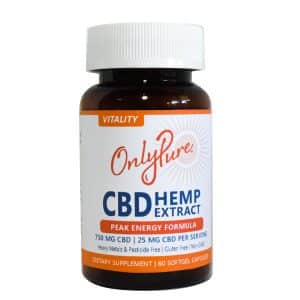Women increasingly turn to natural remedies to enhance their well-being, and CBD has emerged as a prominent player in this wellness revolution. This plant-derived compound, extracted from hemp, offers diverse potential benefits. From easing menstrual cramps to promoting radiant skin, CBD is captivating the attention of women seeking natural solutions for their health concerns.
Understanding How CBD Interacts with the Female Body
Understanding how CBD interacts with our intricate biological systems is crucial to fully appreciating its impact on women’s health.
The Science Behind CBD and the Endocannabinoid System
CBD, short for cannabidiol, is a natural compound derived from the hemp plant. Unlike its more famous counterpart, THC (tetrahydrocannabinol), CBD doesn’t induce psychoactive effects. This means it won’t make you feel “high.” Instead, CBD interacts with our bodies subtly yet profoundly—through the endocannabinoid system (ECS).
Think of the ECS as an internal regulatory system, constantly working to maintain balance within our bodies. This complex network of receptors and neurotransmitters plays a crucial role in managing various physiological processes, including:
- Mood
- Sleep
- Appetite
- Pain
- Inflammation
CBD interacts with the ECS receptors, helping to optimize its functioning and promoting equilibrium.
CBD’s Non-Psychoactive Properties
CBD’s popularity stems mainly from its non-psychoactive nature. Unlike THC, which binds directly to CB1 receptors in the brain, CBD has a low affinity for these receptors. This explains why CBD doesn’t produce the “high” associated with marijuana use. This makes CBD a favorable option for women seeking therapeutic benefits without experiencing any mind-altering effects.
CBD’s Role in Hormonal Balance and Menstrual Health
Hormonal balance is crucial for women’s overall well-being. Fluctuations in hormones can lead to various symptoms that impact daily life. Many women turn to natural remedies like CBD to find relief and support their hormonal health.
Relief from Menstrual Discomfort and PMS Symptoms
For many women, menstruation and PMS come with discomfort. This can manifest as cramps, headaches, bloating, and mood swings. CBD may offer a natural approach to managing these symptoms. While research is still ongoing, some studies suggest that CBD’s anti-inflammatory properties could help reduce pain and discomfort associated with menstrual cramps.
Additionally, CBD’s potential to interact with the endocannabinoid system (ECS) may play a role in mood regulation, which could be beneficial in managing PMS-related mood swings. However, more research is needed to understand the relationship between CBD and PMS symptom relief fully.
Impact on Hormonal Regulation
Hormonal imbalances can significantly impact a woman’s health, and some believe that CBD might play a role in supporting hormonal regulation. For example, anecdotal evidence suggests that CBD for fibroids could be a potential area of interest. Fibroids are noncancerous growths in the uterus that can cause heavy menstrual bleeding and pain, often linked to estrogen levels.
While the research on CBD’s direct impact on estrogen is limited, some studies explore the interaction between cannabinoids and estrogen. Early findings suggest that cannabinoids may influence estrogen production and signaling pathways, potentially contributing to hormonal balance. However, further investigation is needed to understand the full extent of these interactions and their implications for women’s health.
The Skin Care Revolution: CBD’s Benefits for Skin Health
CBD is making waves in the wellness world, and its potential benefits also extend to skin health. This makes CBD for women famous for those looking to enhance their skincare routines. But how can this natural compound work its magic on our skin?
Acne, Psoriasis, and Eczema: A Natural Remedy
Skin conditions like acne, psoriasis, and eczema can be frustrating to manage. They often stem from inflammation and an overactive immune response in the skin. CBD’s anti-inflammatory properties can help soothe these irritated areas.
Moreover, studies suggest that CBD can regulate oil production in the skin. By balancing sebum production, CBD may help prevent acne breakouts. In the case of psoriasis and eczema, CBD’s potential to modulate the immune response could reduce flare-ups and offer relief from itching and redness.
Anti-Aging Effects of CBD on Skin
Beyond addressing specific skin conditions, CBD shows promise as an anti-aging agent. Our skin naturally produces less collagen as we age, leading to fine lines and wrinkles. CBD’s antioxidant properties can help combat free radical damage, which contributes to aging.
CBD might help maintain a youthful appearance by protecting the skin from environmental stressors. While more research is needed, initial findings suggest that CBD could promote collagen synthesis, further supporting its potential to combat signs of aging.
CBD for Mental Well-being: Stress, Anxiety, and Mood Swings
In today’s fast-paced world, women often juggle multiple roles and responsibilities. It’s no surprise that stress, anxiety, and mood swings have become increasingly common. While there are many ways to manage these issues, CBD for women is emerging as a potential natural approach to alleviating these mental health concerns.
Research suggests that CBD may interact with the brain’s serotonin receptors. Serotonin is a neurotransmitter vital in regulating mood, sleep, and anxiety. By influencing serotonin levels, CBD might have a calming effect on the nervous system, reducing feelings of stress and anxiety. Some studies show that CBD may help regulate the body’s stress response system.
Special Focus: CBD During Menopause
Menopause is a natural biological process that marks the end of a woman’s menstrual cycle. It typically occurs between 45 and 55, bringing about various physical and emotional changes due to fluctuating hormone levels. While menopause is a normal part of life, some women experience uncomfortable symptoms. This is where CBD might offer potential benefits, though more research is necessary.
Many women are turning to natural remedies to manage these symptoms, and CBD oil has become increasingly popular. Preliminary research suggests potential benefits for women experiencing menopause-related discomfort. While we can’t definitively say that CBD can treat menopause, the research is promising.
How Can CBD Help During Menopause?
Emerging CBD and menopause research suggests that CBD may interact with the endocannabinoid system (ECS), a complex network of receptors throughout the body. This system is crucial in regulating various bodily functions, including mood, sleep, pain, and inflammation. During menopause, hormonal shifts can disrupt the balance of the ECS, contributing to some of the common symptoms.
Here’s how CBD menopause use is thought to help:
- Mood Regulation: CBD may help regulate mood by interacting with serotonin receptors in the brain. This can be particularly helpful for women experiencing mood swings, irritability, or anxiety associated with menopause.
- Sleep Support: Many women struggle with sleep disturbances during menopause. CBD may improve sleep quality by promoting relaxation and reducing anxiety.
- Bone Health: Estrogen decline during menopause can lead to decreased bone density, increasing the risk of osteoporosis. Some studies suggest CBD may help protect bone health by promoting bone formation.
- Joint and Muscle Discomfort: Menopause can also bring about joint and muscle discomfort. CBD’s potential anti-inflammatory properties help ease these aches and pains.
It’s important to note that research on CBD’s effects on menopause is still ongoing. While early findings are encouraging, more studies are needed to understand its potential benefits and long-term effects fully.
Guide to Choosing the Right Form of CBD for Women’s Health Concerns
Navigating the world of CBD can feel overwhelming with so many options available. Don’t worry! This guide will help you find the perfect CBD form for your needs. Let’s break it down:
CBD Oils and Tinctures: Versatility at Your Fingertips
CBD oils and tinctures are popular for a reason. They’re easy to use and offer precise dosing. Simply place a few drops under your tongue and hold for about 60 seconds before swallowing. This allows for faster absorption into your bloodstream. You can also add CBD oil to food or drinks.
CBD Capsules: Simplicity and Convenience
Prefer a no-fuss approach? CBD capsules provide a pre-measured dose, making them incredibly convenient. Just swallow a capsule with water, and you’re good to go. This method is ideal for those who dislike the taste of CBD oil. OnlyPure even has a specific women’s formula soft gel to make it even easier and better!
CBD Edibles: A Tasty Way to Incorporate CBD
CBD edibles are a fun and delicious way to enjoy the benefits of CBD. From gummies and chocolates to baked goods, you’ll find various options to satisfy your taste buds. Remember that edibles take longer to take effect as they must be digested.
CBD Topicals: Targeted Relief for Skin and Muscles
CBD topicals are applied directly to the skin, providing localized relief. Creams, lotions, salves, and balms are excellent for soothing muscle soreness, joint pain, and skin conditions. You can also find vaginal CBD products designed to address specific intimate health concerns.
CBD Vaping: Fastest Absorption but Proceed with Caution
Vaping CBD offers the fastest absorption rate, but being aware of potential risks is essential. Inhaling heated substances can be harmful to your lungs. If you choose this method, use high-quality, lab-tested products from reputable brands.
Remember, choosing the right form of CBD depends on your personal preferences and desired effects. Start with a low dose and gradually increase until you find what works best.





